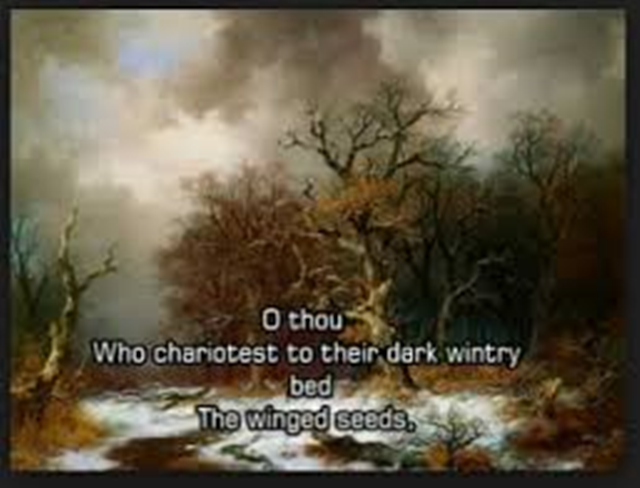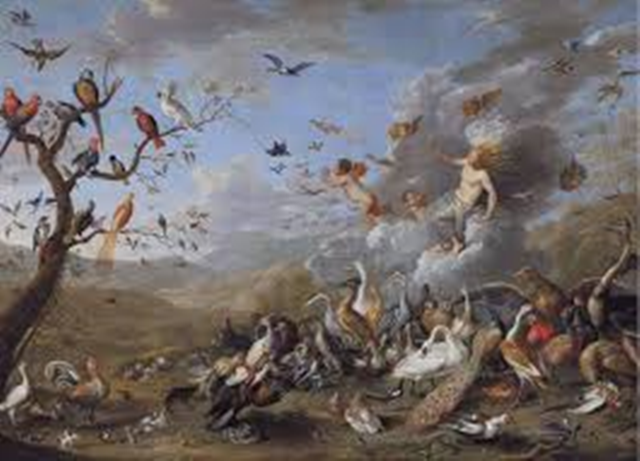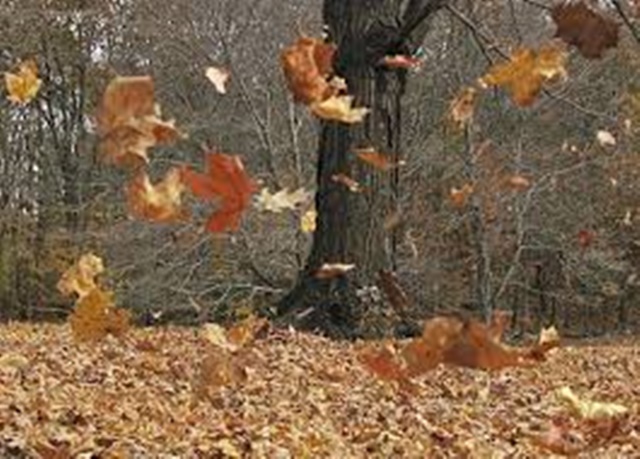






- Total
- General
- Arts
- Book
- Culture
- Economy
- Essay
- Fun/Joke
- History
- Hobbies
- Info
- Life
- Medical
- Movie
- Music
- Nature
- News
- Notice
- Opinion
- Philosophy
- Photo
- Poem
- Politics
- Science
- Sports
- Travel
Poem Ode to the West Wind by Percy Bysshe Shelley
2019.10.06 17:44

Ode to the West Wind
I
O wild West Wind, thou breath of Autumn's being,
Thou, from whose unseen presence the leaves dead
Are driven, like ghosts from an enchanter fleeing,
Yellow, and black, and pale, and hectic red,
Pestilence-stricken multitudes: O thou,
Who chariotest to their dark wintry bed
The winged seeds, where they lie cold and low,
Each like a corpse within its grave, until
Thine azure sister of the Spring shall blow
Her clarion o'er the dreaming earth, and fill
(Driving sweet buds like flocks to feed in air)
With living hues and odours plain and hill:
Wild Spirit, which art moving everywhere;
Destroyer and preserver; hear, oh hear!
II
Thou on whose stream, mid the steep sky's commotion,
Loose clouds like earth's decaying leaves are shed,
Shook from the tangled boughs of Heaven and Ocean,
Angels of rain and lightning: there are spread
On the blue surface of thine aëry surge,
Like the bright hair uplifted from the head
Of some fierce Maenad, even from the dim verge
Of the horizon to the zenith's height,
The locks of the approaching storm. Thou dirge
Of the dying year, to which this closing night
Will be the dome of a vast sepulchre,
Vaulted with all thy congregated might
Of vapours, from whose solid atmosphere
Black rain, and fire, and hail will burst: oh hear!
III
Thou who didst waken from his summer dreams
The blue Mediterranean, where he lay,
Lull'd by the coil of his crystalline streams,
Beside a pumice isle in Baiae's bay,
And saw in sleep old palaces and towers
Quivering within the wave's intenser day,
All overgrown with azure moss and flowers
So sweet, the sense faints picturing them! Thou
For whose path the Atlantic's level powers
Cleave themselves into chasms, while far below
The sea-blooms and the oozy woods which wear
The sapless foliage of the ocean, know
Thy voice, and suddenly grow gray with fear,
And tremble and despoil themselves: oh hear!
IV
If I were a dead leaf thou mightest bear;
If I were a swift cloud to fly with thee;
A wave to pant beneath thy power, and share
The impulse of thy strength, only less free
Than thou, O uncontrollable! If even
I were as in my boyhood, and could be
The comrade of thy wanderings over Heaven,
As then, when to outstrip thy skiey speed
Scarce seem'd a vision; I would ne'er have striven
As thus with thee in prayer in my sore need.
Oh, lift me as a wave, a leaf, a cloud!
I fall upon the thorns of life! I bleed!
A heavy weight of hours has chain'd and bow'd
One too like thee: tameless, and swift, and proud.
V
Make me thy lyre, even as the forest is:
What if my leaves are falling like its own!
The tumult of thy mighty harmonies
Will take from both a deep, autumnal tone,
Sweet though in sadness. Be thou, Spirit fierce,
My spirit! Be thou me, impetuous one!
Drive my dead thoughts over the universe
Like wither'd leaves to quicken a new birth!
And, by the incantation of this verse,
Scatter, as from an unextinguish'd hearth
Ashes and sparks, my words among mankind!
Be through my lips to unawaken'd earth
The trumpet of a prophecy! O Wind,
If Winter comes, can Spring be far behind?

Percy Bysshe Shelley (4 August 1792 – 8 July 1822) was one of the major English Romantic poets, who is regarded by some as among the finest lyric and philosophical poets in the English language, and one of the most influential. A radical in his poetry as well as in his political and social views, Shelley did not see fame during his lifetime, but recognition of his achievements in poetry grew steadily following his death. Shelley was a key member of a close circle of visionary poets and writers that included Lord Byron, John Keats, Leigh Hunt, Thomas Love Peacock and his own second wife, Mary Shelley, the author of Frankenstein.
Shelley is perhaps best known for classic poems such as "Ozymandias", "Ode to the West Wind", "To a Skylark", "Music, When Soft Voices Die", "The Cloud" and The Masque of Anarchy. His other major works include a groundbreaking verse drama, The Cenci (1819), and long, visionary, philosophical poems such as Queen Mab (later reworked as The Daemon of the World), Alastor, The Revolt of Islam, Adonais, Prometheus Unbound (1820) – widely considered to be his masterpiece –, Hellas: A Lyrical Drama (1821) and his final, unfinished work, The Triumph of Life (1822).
Shelley's close circle of friends included some of the most important progressive thinkers of the day, including his father-in-law, the philosopher William Godwin, and Leigh Hunt. Though Shelley's poetry and prose output remained steady throughout his life, most publishers and journals declined to publish his work for fear of being arrested for either blasphemy or sedition. Shelley's poetry sometimes had only an underground readership during his day, but his poetic achievements are widely recognized today, and his political and social thought had an impact on the Chartist and other movements in England, and reach down to the present day. Shelley's theories of economics and morality, for example, had a profound influence on Karl Marx; his early – perhaps first – writings on nonviolent resistance influenced Leo Tolstoy, whose writings on the subject, in turn, influenced Mahatma Gandhi, and through him Martin Luther King Jr. and others practicing nonviolence during the American civil rights movement.
Shelley became a lodestar to the subsequent three or four generations of poets, including important Victorian and Pre-Raphaelite poets such as Robert Browning and Dante Gabriel Rossetti. He was admired by Oscar Wilde, Thomas Hardy, George Bernard Shaw, Leo Tolstoy, Bertrand Russell, W. B. Yeats, Upton Sinclair, and Isadora Duncan.[3] Henry David Thoreau's Civil Disobedience was apparently influenced by Shelley's writings and theories on nonviolence in protest and political action. Shelley's popularity and influence have continued to grow in contemporary poetry circles.
Shelley was born on 4 August 1792 at Field Place, Broadbridge Heath, near Horsham, West Sussex, England. He was the eldest legitimate son of Sir Timothy Shelley (1753–1844), a Whig Member of Parliament for Horsham from 1790–1792 and for Shoreham between 1806-1812, and his wife, Elizabeth Pilfold (1763–1846), a Sussex landowner.
Shelley had two marriages, first with the 16-year-old Harriet Westbrook, which started as elopement. The second marriage was with Mary Godwin, the daughter of his mentor, William Godwin’s.
On 8 July 1822, less than a month before his 30th birthday, Shelley drowned in a sudden storm on the Gulf of Spezia while returning from Leghorn (Livorno) to Lerici in his sailing boat, the Don Juan.
When I read Shelley on Poetry and the Art of Seeing by Dr. 이한중, I was reminded of my old reading with a quote of셸리의 ‘야별(夜別)’ from a comment by 양주동. I tried to find this poem from the poems of Percy Bysshe Shelley without success. Therefore I decided to choose Ode to the West Wind instead, which is one of his great poems.

Kwan Ho Chung - October 7, 2019
Comment 4
-
Thank you very much, 정관호선배님,
for your effort to bring back this poet for us.
Certainly it is a good mental exercise for us as well.
-
Of note, you don't have to be a professor in English to enjoy the great works
in English literature. You can simply google the analysis and the interpretation of the work
as I just did with this well known great work by Shelley.
-
Enjoy another well known Hamlet's soliloquy.
| No. | Subject | Date | Author | Last Update | Views |
|---|---|---|---|---|---|
| Notice | How to write your comments onto a webpage [2] | 2016.07.06 | 운영자 | 2016.11.20 | 18093 |
| Notice | How to Upload Pictures in webpages | 2016.07.06 | 운영자 | 2018.10.19 | 32222 |
| Notice | How to use Rich Text Editor [3] | 2016.06.28 | 운영자 | 2018.10.19 | 5808 |
| Notice | How to Write a Webpage | 2016.06.28 | 운영자 | 2020.12.23 | 43740 |
| 438 | 길에서 만난 한식 [1] | 2024.04.03 | 정관호*63 | 2024.04.09 | 27 |
| 437 |
돌아오는 기러기
[1] | 2024.03.27 | 정관호*63 | 2024.04.18 | 39 |
| 436 | 蜀相(촉상): 촉한 승상 제갈량 [1] | 2024.03.15 | 정관호*63 | 2024.04.12 | 53 |
| 435 | 왕소군 고향에서 [1] | 2024.03.08 | 정관호*63 | 2024.03.20 | 52 |
| 434 | 봄날의 원망 [1] | 2024.02.16 | 정관호*63 | 2024.02.16 | 46 |
| 433 | 내 마음은 가을 달 [1] | 2024.02.08 | 정관호*63 | 2024.02.14 | 481 |
| 432 | 연꽃 한송이 [1] | 2024.02.01 | 정관호*63 | 2024.02.01 | 56 |
| 431 | 詠懷古蹟 其五(영회고적 기오) :고적에서 회포를 읊다 5회 제갈랑 편 [1] | 2024.01.15 | 정관호*63 | 2024.01.17 | 56 |
| 430 | 詠懷古蹟 其四(영회고적 4회): 고적에서 회포를 읊다. 4회. 유비 편 [1] | 2024.01.07 | 정관호*63 | 2024.03.04 | 79 |
| 429 | 除夜 戴復古: 제야 대복고 [4] | 2023.12.30 | 정관호*63 | 2024.01.07 | 73 |
| 428 | 傷春: 상춘 [1] | 2023.12.21 | 정관호*63 | 2023.12.27 | 69 |
| 427 | 蝶戀花·送春 : 꽃사랑 나비; 봄을 보내다 [1] | 2023.11.24 | 정관호*63 | 2023.11.27 | 74 |
| 426 | 山行: 산행 [1] | 2023.11.07 | 정관호*63 | 2023.11.10 | 73 |
| 425 | 楓橋夜泊: 풍교에서 밤에 숙박하다 [1] | 2023.09.20 | 정관호*63 | 2024.02.08 | 58 |
| 424 |
Ode on West Islet
[1] | 2023.08.24 | 정관호*63 | 2024.04.13 | 44 |
| 423 | 過零丁洋: 영정양을 건너다 [1] | 2023.08.17 | 정관호*63 | 2023.08.20 | 95 |
| 422 | 長樂少年行: 장락소년행 [1] | 2023.08.10 | 정관호*63 | 2023.08.12 | 66 |
| 421 | 曲池荷(곡지하): 곡지의 연꽃 [1] | 2023.08.01 | 정관호*63 | 2023.08.02 | 194 |
| 420 |
春暸(춘요): 봄날이 밝아오다
[1] | 2023.07.15 | 정관호*63 | 2023.08.07 | 75 |
| 419 | 歸終南山(귀종남산): 종남산으로 돌아오다 [1] | 2023.07.08 | 정관호*63 | 2023.07.08 | 69 |



Thank you Dr. 이한중 for your great presentation of Shelley on Poetry and the Art of Seeing,
which encouraged me to read some of Shelley's poems.
They are such powerful and philosophical poems requiring a considerable time and effort to peruse.
I will keep trying them later.